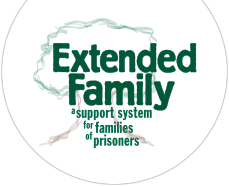The National Center for Health Statistics, National Health Interview Survey, 2019 reported that 6.5% of U.S. children aged 5-17 years old had experienced parental or guardian incarceration, which is considered to be one of four stressful life events (along with exposure to violence in the neighborhood, living with a caregiver who is mentally ill or severely depressed, or living with a caregiver who abuses drugs or alcohol.) In the latest Bureau of Justice Statistics report, released in 2016, state and federal prisoners reported having an estimated 1,473,700 minor children, with the average age of a minor child among parents in federal prison being 10 years old. The Annie E. Casey Foundation estimates that 5 million children experience parental incarceration at some point during childhood, or 1 child out of every 15.
Extended Family was created by Laure Clemons when her family became part of the statistics. Her husband, who had been sober for nine years, chose to break his sobriety one day at lunch and drove intoxicated, hitting another car, killing the driver and severely injuring the other passenger. He was sentenced to prison, leaving Laure to raise their young daughters alone. She searched for resources to help her and her daughters cope and, unable to find any programs to help family members of the incarcerated, created her own. For the past twenty years, Extended Family has offered programs to families struggling with incarceration.
Extended Family works with each family member as part of our “Whole Family” approach. We serve children with any loved one incarcerated, not just parents or guardians. We offer two programs, Extended Family for Kids (EFK), which is specifically for children who currently have, or have ever had, any loved one incarcerated. EFK is appropriate for children in kindergarten through 12th grade and is an evidence-based, nine-lesson curriculum. Extended Leadership Academy is a next step toward success program for older children who have completed EFK, and for children who have been identified as “at-risk” by school counselors or other professionals who work with children. Both programs teach children coping skills to deal with stress and behaviors in ways that won’t get them into trouble.
Adult family members have access to a Resource Database on the Extended Family website which identify agencies around the nation offering help, including online group sessions covering a variety of topics. We also offer helpful hints and strategies for navigating the prison experience. Our staff is specially equipped to answer questions by phone or email for family members needing information or just extra reassurance that they are not alone.
More than 1,800 individuals ready to be released from prison, or “Returning Citizens,” have attended the Extended Family Going Home Workshop, preparing them for success when they are back in their homes and communities. And, new for 2024, we have added Extended Success for Life, a comprehensive twenty-week program for returning citizens which teaches them to “Dream, Learn, and Live,” in hopes of helping them live their lives to the fullest and without reoffending and reentering the justice system.
Our “Whole Family” approach, working with children, adult family members, and returning citizens, is designed to break the cycle of incarceration in families, reduce the risk of recidivism, and help prevent children from entering the juvenile justice system. These combined efforts are how we fulfill our mission, “To offer help and inspire hope.” We welcome partnerships with others who recognize the problem and want to be part of the solution. For more information on how to become involved, contact us through our website, www.extendedfamilyhelp.org, or by email, daphne@extendedfamilyhelp.org.

